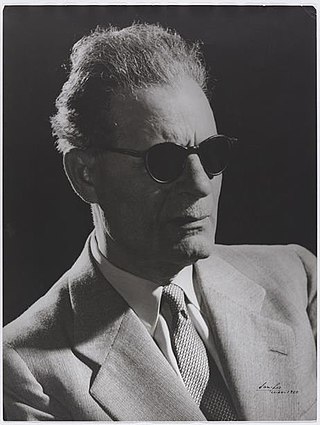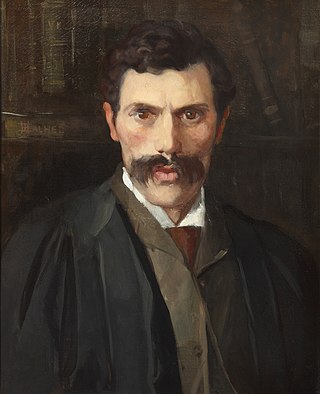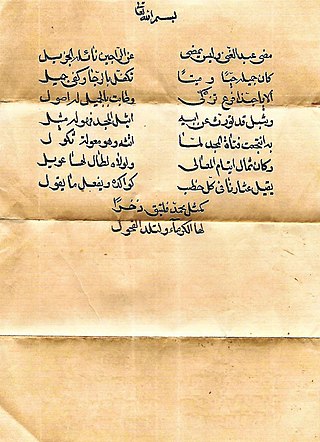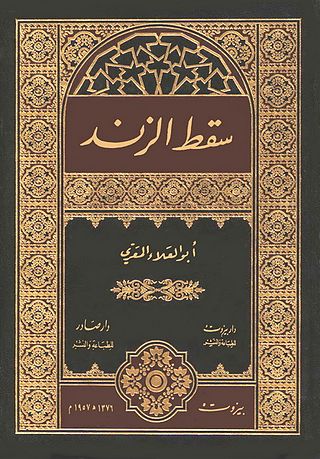Related Research Articles
Arabic poetry is one of the earliest forms of Arabic literature. Pre-Islamic Arabic poetry contains the bulk of the oldest poetic material in Arabic, but Old Arabic inscriptions reveal the art of poetry existed in Arabic writing in material as early as the 1st century BCE, with oral poetry likely being much older still.

Taha Hussein was among the most influential 20th-century Egyptian writers and intellectuals, and a leading figure of the Arab Renaissance and the modernist movement in the Arab world. His sobriquet was "The Dean of Arabic Literature" . He was nominated for the Nobel Prize in Literature twenty-one times.

Abu al-Ala Ahmad ibn Abd Allah ibn Sulayman al-Tanukhi al-Ma'arri, also known by his Latin name Abulola Moarrensis; was an Arab philosopher, poet, and writer from Ma'arrat al-Nu'man, Syria. Because of his controversially irreligious worldview, he is known as one of the "foremost atheists" of his time according to Nasser Rabbat.
Ḥamāsah is a well-known ten-book anthology of pre-Islamic Arabic poetry, compiled in the 9th century by Abu Tammam. Along with the Asma'iyyat, Mufaddaliyat, Jamharat Ash'ar al-Arab, and Mu'allaqat, Hamasah is considered one of the primary sources of early Arabic poetry. The work is especially important for having been the first Arabic anthology compiled by a poet and not a philologist and is the first in the Hamasah literary genre. The first and largest section of the work, al-ḥamāsah (valour), provides the name for several other anthologies of this type.
The Mufaddaliyyat, meaning "The Examination of al-Mufaḍḍal", is an anthology of pre-Islamic Arabic poems deriving its name from its author, Mufaḍḍal al-Ḍabbī, who compiled it between 762 and his death in 784 CE. It contains 126 poems, some complete odes, others fragmentary. They are all of the Golden Age of Arabic poetry (500—650) and are considered to be the best choices of poems from that period by different authors. There are 68 authors, two of whom were Christian. The oldest poems in the collection date from about 500 CE. The collection is a valuable source concerning pre-Islamic Arab life.

David Samuel Margoliouth, FBA was an English orientalist. He was briefly active as a priest in the Church of England. He was Laudian Professor of Arabic at the University of Oxford from 1889 to 1937.
Islamic poetry is a form of spoken word written & recited by Muslims. Islamic poetry, and notably Sufi poetry, has been written in many languages including Urdu and Turkish.

Risālat al-Ghufrān, or The Epistle of Forgiveness, is a satirical work of Arabic poetry written by Abu al-ʿAlaʾ al-Maʿarri around 1033 CE. It has been claimed that the Risālat al-Ghufrān had an influence on Dante Alighieri's Divine Comedy.

Jamil Sidqi al-Zahawi was a prominent Iraqi poet and philosopher. He is regarded as one of the greatest contemporary poets of the Arab world and was known for his defence of women's rights.

Ihsan Abbas was a Palestinian professor at the American University of Beirut, and was considered a premier figure of Arabic and Islamic studies in the East and West during the 20th century. The "author of over one hundred books", during his career, Abbas was renowned as one of the foremost scholars of Arabic language and literature and was a respected literary critic. Upon his death, Abbas was eulogized by University College London historian Lawrence Conrad as a custodian of Arabic heritage and culture, and a figure whose scholarship had dominated the Middle East's intellectual and cultural life for decades.
Nasīb is an Arabic literary form, 'usually defined as an erotic or amatory prelude to the type of long poem called a qaṣīdah.' However, although at the beginning of the form's development nasīb meant 'love-song', it came to cover much wider kinds of content: 'The nasīb usually is understood as the first part of the qaṣīdah where the poet remembers his beloved. In later ages the nasīb stood alone, and in that sense the meaning came to be understood as erotic and love poetry.'

Rithā’ is a genre of Arabic poetry corresponding to elegy or lament. Along with elegy proper, rithā’ may also contain taḥrīḍ.
Al-Shanfarā was a semi-legendary pre-Islamic poet tentatively associated with Ṭāif, and the supposed author of the celebrated poem Lāmiyyāt ‘al-Arab. He enjoys a status as a figure of an archetypal outlaw antihero (su'luk), critiquing the hypocrisies of his society from his position as an outsider.
Abū l-Ḥārith Ghaylān b. ʿUqba, generally known as Dhū al-Rumma was a Bedouin poet and a rāwī of al-Rāʿī al-Numayrī. In the assessment of Nefeli Papoutsakis, 'he stands at the end of a long poetic tradition which, for the most part, expressed the ethos and intellectual preoccupations of the pre-Islamic tribal society of Bedouin Arabs—a fact reflected in the saying of Abū 'Amr b. al-'Alā' that "poetry was closed with Dū r-Rumma" '.
Thabit ibn Jabr, better known by his epithet Ta'abbata Sharran was a pre-Islamic Arabic poet of the su'luk (vagabond) school. He lived in the Arabian Peninsula near the city of Ta'if, and was a member of the Fahm tribe. He was known for engaging in tribal conflict with the Banu Hudhayl and Bajila tribes. He wrote poems about tribal warfare, the hardships of desert life, and ghouls. His work was prominent in the early poetic anthologies, being preserved in both the Mufaddaliyat and the Hamasah. Details of his life are known only from pseudo-historical accounts in the poetic anthologies and the Kitab al-Aghani.
In early Arabian history, su'luk was a term that can be translated as brigand, brigand-poet, or vagabond. The sa'alik were mostly individuals who had been forced out of their tribes and who lived on the fringes of society, although some of them maintained ties with their tribes. Some of the sa'alik became renowned poets, writing poetry about the hardships of desert life and their feelings of isolation. Famous sa'alik include Al-Shanfara, Ta'abbata Sharran, and Urwa ibn al-Ward. The sa'alik were most prominent in pre-Islamic Arabia, but persisted during the Umayyad and Abbasid caliphates.

Saqt az-Zand was the first collection of poetry by al-Ma'arri. It consists of seventy-four qasidas amounting to over three thousand lines, written in his youth and early adulthood, before the year 1020.

The Luzūmiyyāt or Luzūm mā lā yalzam is the second collection of poetry by al-Ma'arri, comprising nearly 1600 short poems organised in alphabetical order and observing a novel double-consonant rhyme scheme devised by the poet himself.
Al-Munakhalal-Yashkuri, whose real name was 'Amr ibn Mas'ud al-Yashkuri, was a pre-Islamic Arab poet and sailor. He is known for composing the poem Fatat Al-Khedr or Fatat al-Qasr and for having an affair with both the Lakhmid princess Hind bint 'Amr, daughter of the former king 'Amr ibn Hind, and queen Al-Mutajarridah|al-Mutajareda, the wife of the king al-Nu'man III.
Pre-Islamic Arabic poetry is a term used to refer to Arabic poetry composed in pre-Islamic Arabia roughly between 540 and 620 AD. In Arabic literature, pre-Islamic poetry went by the name al-shiʿr al-Jāhilī. This poetry largely originated in Najd, with a minority coming from the Hejaz. Poetry was first distinguished into the Islamic and pre-Islamic by Ḥammād al-Rāwiya. In Abbasid times, literary critics debated if contemporary or pre-Islamic poetry was the better of the two.
References
- ↑ "Faculty". Department of Arabic and Islamic Studies. 2021-07-27. Retrieved 2021-09-18.
- ↑ "Georgetown Professor Awarded Distinguished Classical Arabic Poetry Award". The Hoya. 2022-02-03. Retrieved 2022-05-17.